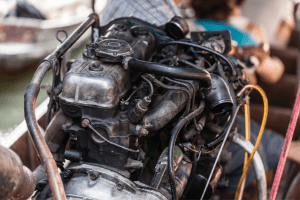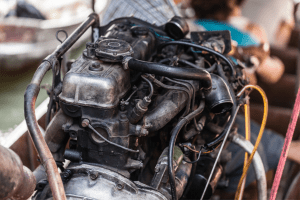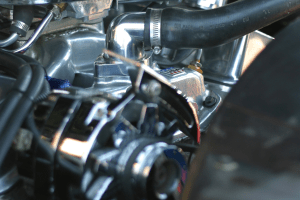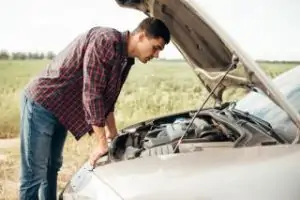One of the greatest inventions of the late 19th and early 20th centuries is the motor vehicle and diagnosing engine noise.
Over the span of a century, the motor vehicle has evolved in highly sophisticated ways to not only help us to get from one place to another faster…
But also us navigate more efficiently.
There’s no denying motor vehicles are a fine piece of machinery that make our lives a lot easier, but they also require maintenance.
From periodic oil changes to tire rotations, occasional filters, and battery changes…
And keeping the car’s belts and fluids in check, all to ensure the vehicle remains functional and safe to drive.
While this may seem complicated, you can learn a lot simply by listening to your vehicle’s engine noise and providing your engine with the best lubricants, filters, and coolants possible.
Given the sophistication of vehicular technology, with poor maintenance, parts can wear and tear faster, overheat, and break down, even while in the middle of driving.
Not only does poor maintenance make motor vehicles unsafe to drive, but repairing them is often more costly than preventive routine maintenance.
One part that requires routine preventive maintenance to continue running smoothly is the engine as it is essentially the heart of the vehicle.
As such, any issues that exist with the engine need to be addressed as quickly as possible to avoid more serious problems further down the road.
This includes not ignoring any unusual engine noises like the five listed below.

A Hissing Engine Noise
One of the first signs of trouble is a hissing engine noise coming from the engine.
This can be caused by any number of problems such as the engine overheating or fluid leaking into hot parts of an engine.
Other likely reasons for a hissing engine include leakages of any kind, such as the coolant leaking out or even exhaust and vacuum leaks.
The latter could be a symptom of vacuum or hose damage.
To properly diagnose the problem and get it repaired, a hissing engine should be inspected by an experienced mechanic.

Squealing Brakes
Another common engine noise that’s experienced by motorists that shouldn’t be ignored is squealing.
While this engine noise doesn’t actually originate in the engine, it’s still a dangerous hazard while driving as squealing is symptomatic of poor brake maintenance.
More specifically, squealing is a strong indicator the vehicle’s breaks don’t have sufficient padding for protection, which can also cause grinding engine noises.
When the brakes especially start grinding, this is a road hazard as the brakes can fail and cause a collision.
It’s highly recommended that squealing brakes get treated early to ensure continued safe driving.
In many cases, the only part that needs to be replaced is the brake padding.
A Knocking Engine
Though not experienced as often by motorists compared to hissing and squealing, it’s still an engine noise mechanics commonly see and that is knocking.
This noise is usually symptomatic of a problem with the engine’s ignition system, which can be caused by any number of things.
One of the common reasons for knocking noise is the presence of fuel inside the cylinder or cylinder reduction.
Another problem in the engine’s ignition system that can cause knocking is poor fuel quality, such as the presence of fuel with a lower octane level than the engine is built for.
Four other problems that can cause knocking noise are carbon buildup and valve impingement, improper spark plug installation…
And a poorly functioning fuel injector that disrupts proper ignition.

A Rumbling Muffler
Related to a knocking engine is a rumbling muffler, which is a health hazard for passengers.
A rumbling muffler is symptomatic of a misalignment in the vehicle’s exhaust system.
This can be caused by damage to the muffler itself, resulting in a hole that allows fumes from the exhaust to leak inside the vehicle, which risks carbon monoxide poisoning.
In cases where a rumbling muffler is accompanied by the vehicle shaking, this is usually symptomatic of a vehicle’s cylinders misfiring.
This in itself, is symptomatic of a poor spark plug.
A Popping Noise

One of the more terrifying sounds a vehicle can make while on the road is a popping noise, which can be symptomatic of one of two problems.
The most common reason for vehicular popping sounds is engine exhaust leaks.
This means that an engine has more fuel in its system than it has air for proper combustion.
When this happens, it prevents the combustion from happening in a timely manner and the exhaust valves open too early, resulting in the loud popping sound.
The latter is especially caused by the exhaust spilling out of the cylinder while the engine is still igniting.
Another less common reason for a popping noise in a vehicle is a dirty air filter.
Don’t Wait For Problems to Get Worse
While each of these engine noises isn’t necessarily a cause for alarm right away, they still shouldn’t be ignored and should be looked into as soon as possible.
Not only can problems be quickly diagnosed and treated early.
But preventive maintenance can avert more costly consequences later on.
This includes expensive repairs to the vehicle and racking up medical bills from any injuries or illnesses sustained as a result of poor maintenance and/or an accident.
Even when the vehicle isn’t experiencing any strange noises or problems, routine preventive maintenance should be done on a regular basis to ensure that the vehicle stays in top shape.
Best Oil For Small Engines: Amsoil Synthetic Oil (#1)
Fake engine noise
In the ever-evolving automotive industry, manufacturers constantly seek innovative ways to captivate consumers and enhance their driving experience.
One such trend that has gained traction in recent years is the use of fake noise.
This practice involves generating artificial engine sounds to mimic the growl and roar of a powerful engine.
While proponents argue that it adds excitement and personality to vehicles, critics raise concerns about authenticity and deception.
The rise of fake noise can be traced back to the emergence of electric and hybrid vehicles.
As the automotive landscape shifts towards these environmentally-friendly options, the absence of traditional noise has become more noticeable.
To address this silence, manufacturers started incorporating artificial engine sounds to provide drivers with a familiar auditory experience.
The aim is to bridge the gap between the quiet hum of an electric motor and the traditional rumble of a combustion engine.
To create fake noise, automakers utilize sound enhancement systems that are either hardware or software-based.
These systems employ strategically placed speakers within the vehicle to emit synthesized sounds that replicate the engine’s roar.
Advanced algorithms analyze various driving parameters such as throttle position, speed, and engine load to generate realistic audio cues that correspond to the vehicle’s performance.
Proponents of fake noise argue that it adds character and excitement to the driving experience.
It can evoke a sense of power and performance, especially in vehicles that may lack the auditory cues associated with traditional engines.
The growl of a sports car or the throaty rumble of a muscular truck can evoke emotions and contribute to the overall enjoyment of driving.
Another aspect to consider is the psychological impact of engine noise on the perception of performance.
Research suggests that the sound of a revving engine can influence how drivers perceive acceleration and speed.
Even if the actual performance remains unchanged, the auditory cues can create a sense of exhilaration and amplify the feeling of power.
However, there are concerns about potential safety implications associated with fake noise.
The artificial sound can mask other important auditory cues, such as sirens or approaching vehicles, which could jeopardize the safety of drivers and pedestrians.
Striking the right balance between auditory stimulation and maintaining situational awareness is crucial.
From an ethical standpoint, transparency and authenticity are key considerations.
Some argue that manufacturers should clearly disclose the use of artificial sounds, ensuring that customers are aware they are not listening to genuine engine noise.
Critics argue that the lack of transparency can be seen as deceptive and undermines the trust between consumers and automakers.
Additionally, the environmental impact of fake noise in electric vehicles raises sustainability questions.
Electric and hybrid vehicles aim to reduce noise pollution and minimize carbon emissions.
By artificially generating engine sounds, automakers may contribute to unnecessary auditory pollution, negating the positive environmental impact of quieter vehicles.
In conclusion, fake noise has emerged as a controversial topic in the automotive industry, raising questions about authenticity, driving experience, and ethical considerations.
While it can enhance the excitement and character of a vehicle, the potential safety concerns and lack of transparency cannot be ignored.
As the automotive landscape continues to evolve, it is essential for manufacturers to carefully weigh the benefits and drawbacks of fake noise and make informed decisions that prioritize consumer trust, safety, and environmental sustainability.
AMSOIL Synthetic Motorcycle Oil vs. Harley Davidson Motor Oil
Bad engine sounds
Bad engine sounds can indicate underlying problems that require attention.
One common issue is knocking or pinging sounds, which can result from factors like low-quality fuel, carbon buildup, or incorrect ignition timing.
To address this, use high-quality fuel and perform regular maintenance, such as cleaning the fuel injectors and ensuring proper ignition system function.
Squealing or screeching noises often point to problems in the belt system. Worn or loose belts, such as the serpentine belt or timing belt, can cause this issue.
Regularly inspect and replace worn belts, ensuring proper tension and alignment.
Rattling or ticking sounds can have various causes, such as loose or damaged engine components, or low oil pressure.
Have a mechanic inspect the vehicle to determine the specific cause and recommend necessary repairs or maintenance.
Grinding or growling noises are concerning and often indicate issues with internal components, such as worn-out bearings. Immediate attention is required to prevent further engine damage.
Seek assistance from a professional mechanic for disassembling the engine and replacing faulty bearings.
Recognizing and addressing bad engine sounds is crucial for maintaining vehicle performance and longevity.
Regular maintenance, timely inspections, and seeking professional help, when needed, are essential for a smooth and enjoyable driving experience.
AMSOIL Synthetic Motorcycle Oil vs. Harley Davidson Motor Oil
Engine rattling noise
Engine rattling noise can be a cause for concern and should be addressed promptly.
There are several potential reasons for this type of noise, and identifying the specific cause is important for determining the appropriate course of action.
One possible cause of engine rattling noise is loose or worn-out components within the engine.
This can include loose belts, such as the serpentine belt or timing belt, or loose bolts or fasteners.
Inspecting and tightening or replacing these components as necessary can help alleviate the rattling noise.
Another common cause of engine rattling noise is improper lubrication. Insufficient oil or dirty oil can lead to increased friction between moving engine parts, resulting in rattling sounds.
Regular oil changes and using the recommended oil viscosity can help ensure proper lubrication and reduce engine noise.
Additionally, engine rattling noise can be caused by issues with the timing chain or timing belt.
If these components become worn or loose, they can create a rattling noise. Replacing the timing chain or belt according to the manufacturer’s recommended maintenance schedule can help prevent this issue.
It is important to note that engine rattling noise can sometimes be a symptom of more serious problems, such as worn-out bearings or internal engine damage.
In such cases, it is advisable to have the vehicle inspected by a qualified mechanic who can diagnose the issue accurately and recommend the appropriate repairs.
In conclusion, if you notice engine rattling noise, it is essential to investigate and address the cause promptly.
Loose or worn-out components, improper lubrication, or issues with the timing chain or belt are common culprits.
Regular maintenance, including inspections and timely repairs, can help ensure a smooth and quiet engine operation.
If the rattling noise persists or is accompanied by other concerning symptoms, it is best to consult a professional mechanic for a thorough diagnosis and necessary repairs.
Diesel engine noise when accelerating
When a diesel engine produces noise specifically during acceleration, there can be several factors contributing to this phenomenon.
Understanding the potential causes can help diagnose and address the issue effectively.
One possible reason for diesel engine noise during acceleration is injector-related problems.
Fuel injectors play a vital role in delivering fuel into the combustion chamber.
If the injectors are worn, dirty, or malfunctioning, they may not provide an optimal fuel-air mixture, leading to uneven combustion and increased engine noise.
Cleaning or replacing the injectors can help resolve this issue.
Another factor that can contribute to diesel engine noise during acceleration is a faulty turbocharger.
The turbocharger is responsible for increasing airflow into the engine, enhancing power output.
If the turbocharger is damaged or experiencing issues, it may produce excessive noise during acceleration.
Inspecting and repairing or replacing the turbocharger can alleviate the noise problem.
Furthermore, engine components like the piston rings, valves, or exhaust system can impact engine noise.
Worn-out or damaged piston rings may result in excessive piston slap noise, especially under load.
Faulty valves or a malfunctioning exhaust system can also contribute to increased noise during acceleration.
Proper inspection and maintenance of these components can help mitigate the issue.
In some cases, the noise may be a characteristic of the diesel engine itself.
Diesel engines generally produce more noticeable noise compared to their gasoline counterparts due to the combustion process and the mechanical nature of the engine.
However, if the noise is significantly louder or abnormal, it is advisable to have the engine inspected by a professional to rule out any underlying problems.
Regular maintenance, including timely oil changes, fuel filter replacements, and overall engine tune-ups, is crucial for maintaining optimal performance and reducing engine noise.
Additionally, using high-quality fuel and following the manufacturer’s recommended service intervals can help prevent or minimize noise-related issues.
In conclusion, diesel engine noise during acceleration can be attributed to various factors, including injector problems, turbocharger issues, worn engine components, or inherent diesel engine characteristics.
Identifying the specific cause through proper inspection and maintenance is key to resolving noise-related concerns.
If the noise is abnormal or persists, consulting a qualified mechanic is recommended for a comprehensive diagnosis and appropriate repairs.
FAQs
Q. Why does my engine sound loud when idling? A. Several reasons can cause a loud engine noise when idling. It could be due to issues with the exhaust system, such as a leak or a faulty muffler. Engine components like the belts, pulleys, or valves may also be worn or misaligned, resulting in increased noise. Additionally, problems with the engine's internal workings, such as low oil levels or worn-out bearings, can contribute to a loud idle noise. It is recommended to have a qualified mechanic inspect the vehicle to determine the exact cause and perform the necessary repairs. Q. What noise does a bad engine make? A. A bad engine can produce various noises depending on the specific problem. Common noises associated with a bad engine include knocking or pinging sounds, which may indicate issues with combustion or improper fuel ignition. Rattling or ticking noises can be a sign of loose or damaged engine components, while grinding or growling noises often indicate problems with internal engine parts like bearings. If you notice any unusual noises coming from your engine, it is best to have it checked by a professional to diagnose and address the underlying issue. Q. Why is my car engine so loud all of a sudden? A. If your car engine suddenly becomes loud, it could be a cause for concern. One possible reason is an exhaust system problem, such as a damaged or disconnected component. This can result in increased noise levels. Another possibility is a malfunctioning or failing part within the engine, such as a worn-out belt or a faulty valve. Rapid changes in engine noise could also be an indication of a fluid leak or an issue with the engine's internal workings. It is advisable to have the vehicle inspected by a qualified mechanic to determine the cause and take appropriate action. Q. What does it mean when the engine makes noise? A. When the engine makes noise, it usually signifies that something is amiss. The specific type of noise can provide clues about the underlying issue. For example, knocking or pinging sounds may indicate problems with the combustion process or fuel quality. Rattling or ticking noises can suggest loose or worn-out components. Grinding or growling noises often point to issues with internal engine parts. It is important to pay attention to these noises and have the engine checked by a professional to diagnose and resolve any potential problems. Ignoring engine noises can lead to further damage and costly repairs.
